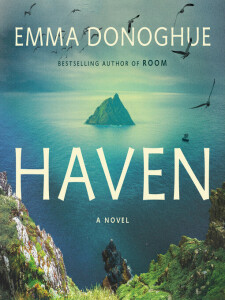
My horror at the devastation wrought by evangelical “Christians” (who eschew the basic tenets of Christianity) in the U.S. made this novel tough going for me. I couldn’t get past my outrage that anyone would submit themselves to torture and starvation in the name of religion when salvation—an earthly one to be sure—was so easily available.
Donoghue, author of Room, has constructed another story where people are confined in a tiny location, dependent on the whims of an all-powerful tyrant. In 600 A.D. Cluain Mhic Nóis, an Irish monastery, hosts a visiting holy man, perhaps the holiest man on earth: Artt, legendary for having read every book in existence and surviving the plague with the loss only of a finger.
While there, Artt has a dream—surely a holy vision!—that he should found a new monastery on a remote island off the Irish coast, far from the earthly temptations that have, in his view, corrupted Cluain Mhic Nóis. The dream/vision/mandate from God further commands that he take two of the monks: Cormac, an older man who came late to religion and is fond of telling stories, and young, impressionable Trian, who was given to the monastery at 13.
They fetch up on a stony isle that it is hard to imagine anyone could survive a week on, though the author’s note assures us that it is indeed the site of a medieval monastery. The fascination for me was in the various ways they—mostly Cormac to be honest—find to survive in this hostile environment. Trian, too, captures the heart with their sweetness and love for everything—birds, fellows, mussels, God. Artt is just, in my opinion, a self-righteous, narcissistic blowhard, convinced that he alone is the conduit of God’s word.
Well, obviously I’m the wrong audience for this book. I could hardly bear continuing to read of their hardships, knowing that civilisation—with, sure, its evils, but also actual sustenance and shelter—is only a short boat ride away. The writing is gorgeous but the story infuriating.
I have my moments of thinking like Artt that the world is incurably decadent, and wanting to preserve some small piece of what life could really be like. But this is not the way. And I’m far too practical to take my minions, even if I could bear to have minions, away from necessities like food, water and shelter to create religious monuments. Nor could I ever sacrifice others to my vision of my own greatness.
So, while I admire the prose, the story left me cold. No, not cold, but a turbulent mix of emotions: frustration, anger, sadness, a hint of longing. The book challenged me to think outside my own box, a challenge I guess I failed. Stil, I’m left thinking of John Lennon’s Imagine: no religions, nothing to die for.
Have you read a novel that challenged you?
